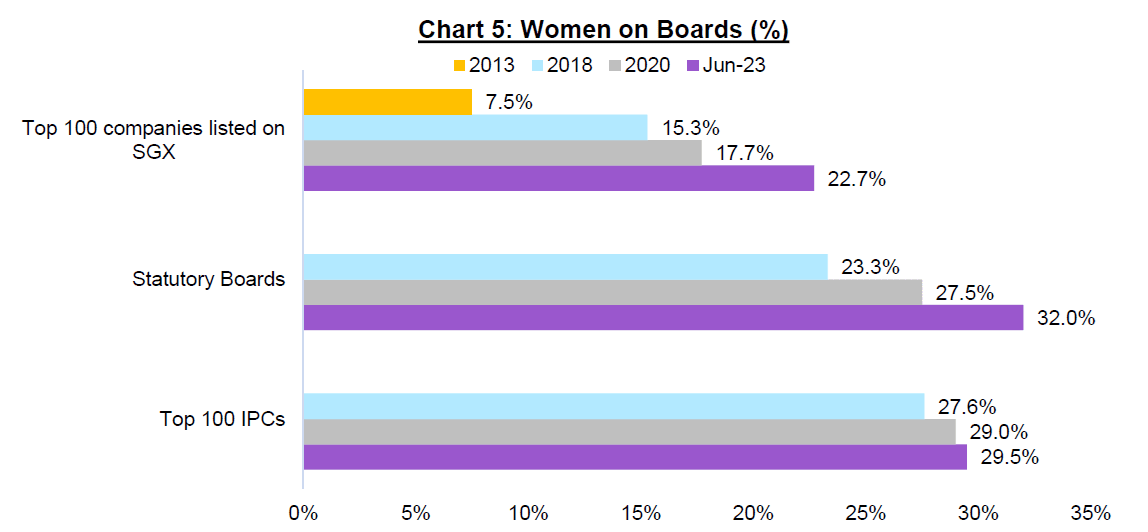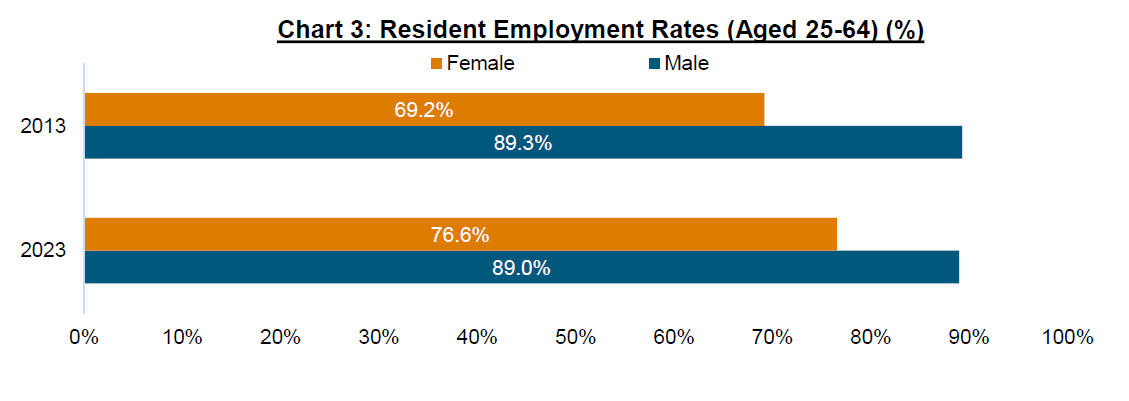Gender pay gap in Singapore narrows, more women in leadership roles: MSF report

(Photo credit: iStock)
Source: Channel News Asia
The gender pay gap in Singapore has narrowed in recent years and more women are in leadership roles, according to a Ministry of Social and Family Development (MSF) report released on Friday (May 10).
It is the first report charting the progress of women's development since the White Paper was published in March 2022. The White Paper proposed 25 action plans in key areas, including equal opportunities in the workplace.
According to MSF's report, the unadjusted median gender pay gap for full-time resident employees aged 25 to 54 in Singapore dropped from 16.3 per cent in 2018 to 14.3 per cent in 2023.
“One key reason for the gender pay gap is occupational differences,”
said the report.
“When we compare men and women with similar characteristics in age, education, occupation, industry, and usual hours worked, the adjusted gender pay gap is lower at 6 per cent in 2023.”
The adjusted gender pay gap in Singapore reflects unmeasured characteristics, such as differences in the effects of parenthood and caregiving responsibilities, which women tend to shoulder more than men, it said.

Percentage of women on the boards of statutory boards, IPCs and top 100 companies listed on the Singapore Exchange. (Source: Council for Board Diversity)
The report also found that representation of women in leadership roles within the private, public and people sectors has continued to improve.
The government works with the Council for Board Diversity to increase women's representation on the boards of the top 100 companies listed on the Singapore Exchange (SGX) to 25 per cent by 2025, and 30 per cent by 2030.
It has also set targets to increase women's representation on the boards of the top 100 charities and statutory boards to 30 per cent as soon as possible.
According to SGX rules, companies are required to disclose their board's gender diversity policy.
For the top 100 SGX-listed companies, the percentage of women on boards tripled from 7.5 per cent in 2013 to 22.7 per cent as of June 2023.
Statutory boards have also exceeded the 30 per cent target of women on boards as of June last year, while the top 100 charities are close to meeting their 30 per cent target.
The report also found that the resident employment rate for women aged 25 to 64 rose from 69.2 per cent to 76.6 per cent in the past decade.
The gap between male and female employment rates has also narrowed within the same time frame, decreasing from 20.1 percentage points in 2013 to 12.4 percentage points in 2023.

Singapore's resident employment rates. (Source: Ministry of Manpower)
There has also been an upward trend in the proportion of women employed in professional, managerial, executive, and technician (PMET) roles and traditionally male-dominated areas, the report said.
The share of women aged 15 and older among PMET occupations rose from 42.3 per cent in 2013 to 46.7 per cent last year.
CONTINUED EFFORTS NEEDED
Over the past decade, Singapore has maintained high international rankings on gender equality.
In the most recent United Nations Gender Inequality Index released in March, Singapore ranked eighth worldwide and first in the Asia Pacific for having a low level of gender inequality.
The report shows that Singapore has made good progress across different spheres, said MSF in a press release, but continued efforts are needed to address gender stereotypes.
“Beyond policy and legislation, a whole-of-society effort is needed to shift mindsets and break gender stereotypes to achieve progress on gender equality,”
said the report.
“Changing mindsets on gender roles requires the partnership of both men and women. This partnership starts in the family, and continues in our schools, workplaces, and in the community.”
Students are encouraged to explore a variety of education and career pathways based on their strengths and interests, and not be limited by gender stereotypes, said the report.
Through Character and Citizenship Education curriculum, they "gain an understanding of the equity of familial roles regardless of gender, and that parental roles and familial responsibilities can be shared and mutually agreed upon amongst family members".
In the workplace, managers and colleagues can support and help facilitate the re-entry of mothers back to the workforce as well as provide equal support for fathers who need to take leave to care for their children, the report said.
The take-up rate of paternity leave has increased from 47 per cent in 2016 to 53 per cent in 2021. Government-paid paternity leave was increased from two weeks to four weeks in 2024, with the additional two weeks provided on a voluntary basis.
"While there has been a positive mindset shift towards workplaces being more supportive of fathers’ involvement in child-raising, as seen by the increase in the take-up rate for paternity leave, more remains to be done,"
said the report.
OTHER FINDINGS
The report also found that progress had been made in areas such as women’s health and protection from violence.
Healthcare services have been improved for different groups of women in areas such as maternal and child health, and senior care services, it said.
These include easy access to quality maternal care services and resources for parenthood, as well as national initiatives such as Healthier SG and Age Well SG to support all Singaporeans and residents, including women, in taking care of their health.
A new Online Criminal Harms Act passed in July last year has enabled the government to direct online service providers - including social media platforms and messaging apps - to prevent accounts and content perpetrating crimes from interacting with or reaching Singapore users.
Amendments to the Women’s Charter in 2023 have also empowered victims to better protect themselves and strengthened the government's ability to intervene in family violence cases.
Minister of State for Social and Family Development Sun Xueling said:
"It is encouraging to see that our women have continued to make progress at home, at work and in society since the White Paper was published two years ago.
"This was only made possible through the collective efforts of the community, corporates, schools and government.
"All of us can and continue to do more so that men and women can partner each other as equals and both can pursue their aspirations freely and fully. We need to shift mindsets on gender roles and address challenges that women face to advance towards a fairer and more inclusive society."
